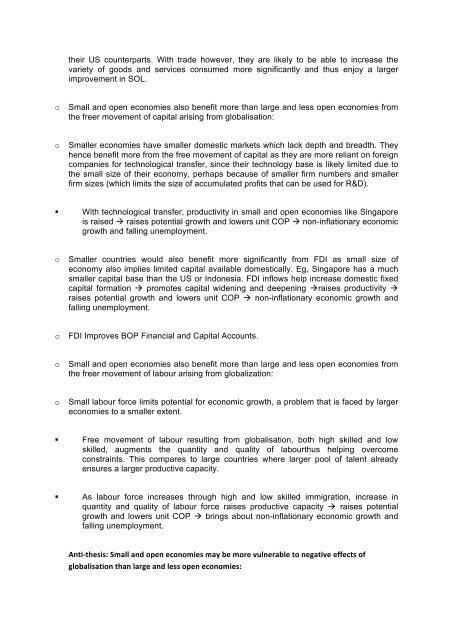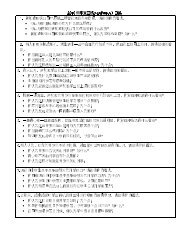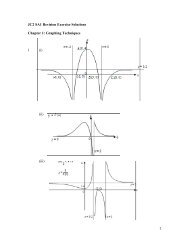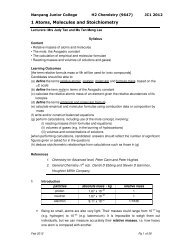Suggested Answers of BT2 Revision Package - ASKnLearn
Suggested Answers of BT2 Revision Package - ASKnLearn
Suggested Answers of BT2 Revision Package - ASKnLearn
- No tags were found...
Create successful ePaper yourself
Turn your PDF publications into a flip-book with our unique Google optimized e-Paper software.
their US counterparts. With trade however, they are likely to be able to increase thevariety <strong>of</strong> goods and services consumed more significantly and thus enjoy a largerimprovement in SOL.oSmall and open economies also benefit more than large and less open economies fromthe freer movement <strong>of</strong> capital arising from globalisation:oSmaller economies have smaller domestic markets which lack depth and breadth. Theyhence benefit more from the free movement <strong>of</strong> capital as they are more reliant on foreigncompanies for technological transfer, since their technology base is likely limited due tothe small size <strong>of</strong> their economy, perhaps because <strong>of</strong> smaller firm numbers and smallerfirm sizes (which limits the size <strong>of</strong> accumulated pr<strong>of</strong>its that can be used for R&D).§With technological transfer, productivity in small and open economies like Singaporeis raised à raises potential growth and lowers unit COP à non-inflationary economicgrowth and falling unemployment.oSmaller countries would also benefit more significantly from FDI as small size <strong>of</strong>economy also implies limited capital available domestically. Eg, Singapore has a muchsmaller capital base than the US or Indonesia. FDI inflows help increase domestic fixedcapital formation à promotes capital widening and deepening àraises productivity àraises potential growth and lowers unit COP à non-inflationary economic growth andfalling unemployment.oFDI Improves BOP Financial and Capital Accounts.oSmall and open economies also benefit more than large and less open economies fromthe freer movement <strong>of</strong> labour arising from globalization:oSmall labour force limits potential for economic growth, a problem that is faced by largereconomies to a smaller extent.§Free movement <strong>of</strong> labour resulting from globalisation, both high skilled and lowskilled, augments the quantity and quality <strong>of</strong> labourthus helping overcomeconstraints. This compares to large countries where larger pool <strong>of</strong> talent alreadyensures a larger productive capacity.§As labour force increases through high and low skilled immigration, increase inquantity and quality <strong>of</strong> labour force raises productive capacity à raises potentialgrowth and lowers unit COP à brings about non-inflationary economic growth andfalling unemployment.Anti-‐thesis: Small and open economies may be more vulnerable to negative effects <strong>of</strong> globalisation than large and less open economies:

















